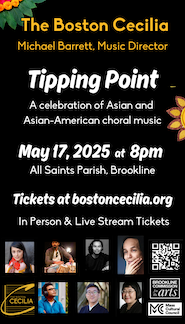Poulenc works fare best in mixed Christmas program from Boston Cecilia
Boston Cecilia began its Christmas concert “His Unresisting Love” Sunday night at All Saints Parish church in Brookline with an unlikely alternation of nativity music by William Byrd and Francis Poulenc. These two composers were separated by 400 years, and enormous shifts in style and musical language, not to mention the cultural divide of the English Channel.
The ensemble did not hit its stride until the second Byrd piece, Dies sanctificatus, and even then, the sopranos were still a bit shaky next to the stronger tenor and bass sections, and some of the running lines in the lower voices threatened to fall apart.
Once warmed up, the choir presented a beautifully blended and seamless sound in the Byrd pieces while ably navigating the chromatic harmonies and sectional striations of the Poulenc.
The highlights of his set were overwhelmingly those of Poulenc, beginning with his O Magnum mysterium. This setting, in contrast to hushed rise and fall of Byrd’s setting, opened with striking dark timbres from the lower voices which set up a strict delineation of registers culminating a satisfying dynamic swell in the climactic phrase.
Quem vidisits pastores dicite, the second Poulenc selection in this set was the highlight of the “In Nativitate Domini” section of the program. The church’s resonant space gave Poulenc’s short phrases a haunting resonance that was amplified by the soft “oohs” of the accompaniment. The contrasting declamatory phrases of the final lines were rendered with a dramatic force that revealed the power and skill of this revered ensemble. Likewise, the fanfare-style phrases of Poulenc’s Hodie Christus natus est provided a rousing finale to this set and motivated Boston Cecilia to bring all their joy to the performance.
While the Byrd selections were relatively sedate, they did provide ample opportunity to enjoy solos from countertenor Dan Roihl, who possessed one of the best and most expressive voices in the ensemble.
Barbara Bruns’ organ solo Noel: Où s’en vont ces gais Bergers was the perfect interlude between the Byrd-Poulenc set and carols by conductor Nicholas White. Bruns’ crisp performance made it easy and enjoyable to follow the theme through Pierre Dandrieu’s lively set of variations.
After a palette cleansing audience sing-a-long of Hark! the herald angels sing, the first half of the program concluded with two new carols composed by conductor Nicholas White on texts by David Evett. His first composition, His Unresisting Love, used both Latin and English text in an antiphonal arrangement. White’s sense of harmony leaned more towards Poulenc’s chromaticism, and his showcasing of the bass section was a wonderful addition to the program, as was the beautiful soprano solo from Katie Boardman in the concluding verse.
While White’s choir arrangement is impressively expansive, his fairly traditional treatment of the text failed to fully capitalize on all of its expressive possibilities. God’s Dream was similarly traditional, and again highlighted the bass section, while showing some invention in the use of repeated text as accompaniment to longer melodies.
“Advent,” the second half of the program opened with Vox Dicentis: Clama by early 20th-century composer Edward Naylor. This piece began with exultant phrases which the Boston Cecilia imbued with a gorgeous full sound, and ended with tender sequence of soprano and tenor solos from Alison Weaver and James Turner over accompaniment from the full choir.
After an audience participation performance of Good King Wenceslas, Boston Cecelia then moved into a decidedly lightish pair of carols with organ accompaniment from John Rutter. The Sans Day Carol‘s melody was almost too cute while What Sweeter Music provided only the blandest of romanticism. While the choir gave it their all, there was little inspiring in either the compositions or the performance. One wished for another lively organ solo to alleviate the monotony.
The program concluded with a final piece by Nicholas White. The Cherry Tree Carol had an intriguing harmonic sensibility that, when combined with the undulating organ accompaniment, took on an intriguing prog rock flavor. Unfortunately, White’s static setting failed to capitalize on the intense drama of the text, which recalled a strongly emotional encounter between Mary and Joseph.
Posted in Performances

